Reading view
Does the Future Belong to China?
Does the Future Belong to China?
Digital Dopamine Is Consuming America. It’s Time to Fight for IRL.
You’re Probably Doing Small Talk Wrong
After Deadly Lisbon Funicular Crash, Portugal Declares a Day of Mourning

© Horacio Villalobos/Getty Images
香港高官和主流媒体齐齐唱好阅兵 却只字未提习京谈「长生不老」

在「9.3大阅兵」翌日,全港只有一份报章的头版头条不是以歌讼阅兵彰显的中国强大,不少篇幅更是报道官方齐齐发文唱好阅兵,有高官甚至发文细说家属与抗战的渊源;但同场广受全球关注的「习(近平)丶(普)京丶金(正恩)」三位领导人谈「长生不老」一事,在香港的主流媒体却未见提及,只有少数独立媒体有作报道。有评论表示,港媒惟恐报道对中共不利的消息会误堕《港区国安法》的「煽惑」法网,已难靠新闻触觉报道事实;至于高官撰文攀抗战关系,更是反映香港官场「承上」迎合的文化流行。
为赏阅兵 港府摆「空城计」
在刚过去的「9.3大阅兵」,港府派出360人的庞大代表团赴京参与,令政府近乎摆出「空城计」,因为在三司十五局的政制高层架构中,只有政务司司长陈国基因要署任特首职务而留港,15名政策局长全部随代表团北上。另外,立法会89名议员当中,有65人赴京观看阅兵,占总体议员人数超过七成。
除了行政丶立法机关近乎总动员挺阅兵外,港府高层在观看阅兵后,均有在社交平台发文,并集体引用中国国家主席习近平的讲话,分享对阅兵的感受;更有高官分享家族与抗战有关的经历。以律政司司长林定国为例,他在大谈阅兵感受的帖文中,便公开他父亲是向日本追讨军票赔偿的索赔协会会员的身份,并上传父亲的会员证和日本军票的相片作证明;商务及经济发展局局长丘应桦则说,自己是抗战先烈的后人;民政事务局局长麦美娟也说,她的外公曾是东江纵队成员,在抗战时英勇作战,肩膀上留下被日军打中的子弹弹孔等。

学生丶囚犯「被观看」阅兵
另外,港府也动员不同界别,安排观看阅兵直播。传统亲中组织香港工会联合会(简称工联会)邀请300人一同看阅兵直播;多家中小学也安排学生在上课时观看阅兵直播,并安排学生接受媒体采访,分享阅后的激动感和自豪感;负责管理监狱的惩教署也在官方的社交平台上传多张照片,当中不乏各院所在囚人士看阅兵直播,帖文则交代:观看阅兵直播能让在囚人士铭记历史丶缅怀先烈,了解国家现代化的国防发展及强大国力,进一步提升民族自豪感及爱国精神。
如此盛事,自然成为今(4日)天主流媒体的主题。全港十三家报章中,除了畅销的《东方日报》外,全都以阅兵凸显中国硬实力和坚持走和平道路为头版头条的主题,唱好之声不绝;部分报章的社评亦以阅兵为主题。不过,在阅兵期间发生的另一焦点事件 - 央视直播揭「习京金」谈「长生不老」和「器官移植」的消息,在以往报道中国新闻最快最淮见称的主流媒体版面却未见出现,只有Yahoo港闻和部分独立媒体予以报道。
程翔:港媒不报道领导人谈长生不老是《国安法》下的哀歌
对于港府高官和香港主流媒体处理阅兵直播的做法,引发各界讨论。资深媒体人梁家权分析,港府官员纷纷引述习近平讲话发文谈阅兵,反映近年香港官场「承上」主义的风气盛行,官员集体学习和熟读习近平讲话已成文化,以配合和紧贴「上意」。资深媒体人李锦洪分析称,香港高官多接受外国教育,并不熟悉中国历史和国情,在涉及国家主权和历史等议题上,难有独特观点,为安全计,只好引述主席的话,照本宣科。
另一位资深媒体人吴志森把着眼点放在港府安排在囚人士观看阅兵直播一事上,质疑这对提升在囚人士的爱国精神有多大帮助,认为惩教署的做法,只是想表忠。
至于香港主流媒体只字未提习普金三人谈「长生不老」等的对话内容,资深记者兼时事评论员程翔表示,三人谈话内容或已透露中国的首长健康工程已取得成果,是爆炸性的消息,重要性不次于阅兵和新型军备的展示,如果香港媒体能纯粹用新闻触觉判断,必定会报道和跟进,但在《港区国安法》生效后,《苹果日报》和网媒《立场新闻》的遭遇,使香港的媒体动辄得咎,不敢报道对北京不利或不喜欢的消息,以至丑闻,形容是《国安法》下香港新闻界的悲哀。
他估计,香港主流媒体冷处理三国领导人的对话内容,与当中有提及「器官移植」的议题有关,因为早前就中港跨境器官捐赠恒常化的问题,已在港触发激烈的讨论和反响,或担心广泛报道会重新触发社会讨论和反对声音。
“特朗普去世”阴谋论为何喧嚣尘上
“特朗普去世”阴谋论为何喧嚣尘上


Allies ready to support Ukraine before and after peace deal, says UK

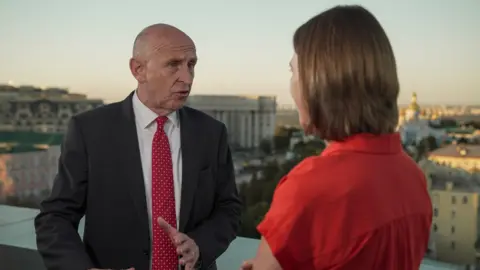 BBC
BBCThe UK and its allies stand ready to support Ukraine before negotiations to end the war as well as to secure an eventual peace deal, the UK defence secretary says.
On the eve of a top-level meeting in Paris, John Healey told the BBC in Kyiv that Ukraine's allies would "help make the skies safe, to make the seas safe, and to secure the land", once a peace deal had been struck.
But moments earlier, Russia's President Vladimir Putin had conveyed a defiant message from China, vowing that his full-scale invasion could continue.
Healey suggested there was bluster in Putin's words, insisting that Russia was under pressure. He also praised US President Donald Trump who he said had "brought Putin into talks" and "not closed off any options", despite widespread criticism of the warm welcome Trump gave the Russian leader last month in Alaska.
As late as Tuesday, Trump said he was "disappointed" in Putin, but he has said that before. He has also threatened to punish the Russian leader for the apparent refusal to end the war - or even meet Ukraine's President Volodymyr Zelensky for peace talks.
When asked on Wednesday whether the war in Ukraine could end soon, Putin said "there is a certain light at the end of the tunnel".
"It seems to me that if common sense prevails, it will be possible to agree on an acceptable solution to end this conflict," he said, before threatening: "If not, then we will have to resolve all our tasks militarily."
He went on to list Russia's maximalist demands as usual - including for the authorities in Kyiv to end what he called discrimination against ethnic Russians - one of the allegations mentioned as a pretext for the full-scale invasion of the neighbour he launched in February 2022.
As for meeting Zelensky, Putin seemed to mock the very idea – which Trump had said he was ready for.
"I have never ruled out the possibility of such a meeting. But is there any point? Let's see," Putin said in Beijing.
Zelensky could always go to Moscow to see him, he said – a "knowingly unacceptable" idea, Ukraine's foreign minister was quick to point out.
Last week, France's President Emmanuel Macron suggested Putin was "playing" Trump.
But John Healey stressed that the US president "has not ruled out any further action, including economic measures, to put more pressure on Putin".
"We in the Coalition of the Willing, nations like the UK are willing to put extra economic pressure on Putin. We're willing to give extra aid to Ukraine so they can keep in the fight.
"It's why we've passed today £1bn ($1.24bn) of seized Russian assets, recycled into military aid and kit to Ukraine. If you like, Putin's dirty money returned with interest."
On Thursday, Macron will host a meeting of that so-called Coalition of the Willing - a grouping of allies of Ukraine, committed to enforcing any peace deal.
A source at the Élysée, Macron's office, has said the group are now ready to provide security guarantees for Ukraine, only waiting for US confirmation that it will act as the ultimate backstop.
The proposed deal includes continuing to train and supply Ukraine's own army.
It also envisages European troops being deployed to Ukraine - in unspecified numbers - to deter any future to Russian aggression - a signal that Ukraine can count on its allies "full solidarity and... commitment", the Élysée source said.
Such a deployment would need a ceasefire, the responsibility for which "falls to the Americans who are negotiating with the Russians".
John Healey refused to give details, despite being pressed, "because that will only make Putin wiser."
The German government is also playing down expectations of any big announcement at Thursday's meeting.
For the time being, like Italy and other coalition members, Berlin has ruled out sending soldiers to Ukraine to police any future peace on the ground.
A German government spokesman told the BBC that the priority for now was getting Russia to agree to a ceasefire - which Putin has consistently rejected.
President Trump pressed Putin for that during their summit in Alaska last month, then emerged to cite Putin's argument that finding a final deal would be a better way out of the the conflict.

 Reuters
ReutersIn the meantime, Russia's aerial attacks have intensified in both frequency and scale. On Wednesday night more than Russian 500 drones and 24 cruise missiles were launched at Ukraine.
Across the country, as civilians sheltered in basements or on the metro, the air defence guns went to work.
As usual, the government did not say whether any military targets were hit, but the impact for civilians is often devastating.
Last week, a Russian missile hit a block of flats in Kyiv killing 22 people, including four children, in one of the deadliest strikes since Russia's full-scale invasion.
There is now a heap of stuffed toys in the ruins, and photographs.
From shattered stairways, residents emerge with potted plants and bags of clothes covered in dust that somehow survived the strike. A few steps away, others stand and stare at the wreckage.
A teenage girl said she had left the bomb shelter that morning because it filled with smoke after the first missile hit. Then a second landed across the road and her sister was killed.
Ihor Maharynsky only survived because he was out of town that night. His wife, Natalia, was in their fifth-floor flat and didn't make it to the shelter. He had to identify her body in the mortuary.
"What kind of strategic target is there here?" he demanded, looking around at a car park and a technical college nearby. "There's nothing."
Right now, Ihor sees no prospect at all of peace with Russia.
And like many Ukrainians, he is furious at Donald Trump for rolling out the red carpet in Alaska last month for Vladimir Putin.
"Peace talks with Putin? With this ****?" Ihor wanted to know, with a string of expletives. "It is peaceful people who are dying."
Guyana President Irfaan Ali claims victory in general election

 Reuters
ReutersGuyanese President Irfaan Ali has claimed a second five-year term in office, even as official final results from Monday's general election are yet to be published.
Ali's People's Progressive Party (PPP) secured at least 242,000 votes in the poll, claiming majorities in eight of the 10 districts in the South American country, according to Reuters news agency.
We Invest in Nationhood (WIN), a new political party founded just three months ago, came in second with around 109,000 votes.
Ali, 45, campaigned on a pledge to use the country's vast oil reserves, discovered in 2019, to improve infrastructure and reduce poverty, while navigating territorial tensions with neighbour Venezuela.
It is not yet clear how many seats each party will have in the 65-member parliament, but the current vice-president, Bharrat Jagdeo, told local media that the PPP would have a "bigger majority" than at the last election in 2020.
Despite a lower turnout than at the last election, the PPP appeared to have increased its vote share - while the long-term opposition A Partnership for National Unity trailed in third.
Much of this election centred on how parties would manage revenues from massive oil reserves discovered by the oil giant ExxonMobil in 2019.
Since 2019, the company says it has found billions of barrels' worth of oil in Guyanese waters and territory - causing the state budget to quadruple.
With a population of around 800,000, Guyana now has one of the highest levels of proven crude oil reserves per capita in the world - and is one of the region's fastest-growing economies.
But opposition parties say there is unfair distribution of oil earnings to groups connected to the PPP, accusations the ruling party denies.
Businessman Azruddin Mohamed, leader of the WIN party, alleged voting irregularities in Monday's election, even as he celebrated the party having "shaken the pillars of Guyana's political establishment".
Observers from the Organization of American States were deployed to Guyana for the election and have not yet reported any instances of electoral fraud.
The election came the day after Guyanese police said that a boat carrying election officials and ballot boxes was "shot at from the Venezuelan shore" - in the contested Essequibo region.
Venezuela denied being behind the incident - which came as the two countries are locked in a dispute over competing claims to the oil-rich region.
新学期,新气象:正版软件 & 付费栏目限时优惠
Former Suntory Boss Says He Used CBD Supplements for Jet Lag

© The Asahi Shimbun, via Getty Images
Rayner consulted three people about flat purchase
Angela Rayner initially consulted three people about the purchase of her £800,000 flat in Hove, which she has admitted to underpaying stamp duty on, the BBC understands.
It is understood that the deputy prime minister consulted one individual experienced in conveyancing and two experts on the law around trusts before the purchase.
However, it is unclear if any of those people were experts in complex tax law and it is not known if they knew about the full details of the trust.
Rayner has denied she tried to dodge the full tax rate on the apartment and blamed the "mistake" on initial legal advice that failed to "properly take account" of the situation.
She has been under mounting pressure in recent weeks after reports emerged she had saved £40,000 in stamp duty on her East Sussex flat by not paying the higher rate reserved for additional home purchases.
She says she acted on the expert advice at the time, but has in recent days learned that arrangements involving her family home in Greater Manchester meant she should have paid a higher rate.
Technology Secretary Peter Kyle told the BBC Sir Keir Starmer continues to have full confidence in Rayner, but he said it will be up to the Independent Adviser on Ministers' Interests, Sir Laurie Magnus, to decide whether she took appropriate advice.
If precedent is a guide, the investigation by Sir Laurie that may decide Rayner's future could be done in a matter of days.
Speaking on the BBC's Newsnight programme, Kyle said he had "full confidence" that the investigation process "will get to the bottom of things" and reassure the public.
Kyle conceded that while mistakes were made, he believed the deputy prime minister acted in good faith by consulting legal advice.
"This is somebody who's striving to be upfront and do the right thing," he said.
He added the question would be whether Rayner took enough precautions when making the purchase.
"At the end of the day, people will be looking at Angela based on the outcome of this report and what they want to see is, did she strive to make the right decision?"
"Did she try and avoid scrutiny? No. Did she take legal advice and try and understand the intricacies of the complex family situations she was in and the purchase of a property? Yes," he said.
Former Tory chief whip Mark Harper told Newsnight he thought Rayner should resign and that "there were a lot of holes" in her story.
Harper said asking ministers to defend her publicly if she knew she might be liable for extra tax would be a breach of the ministerial code.
"Up until yesterday, ministers were going out saying it was all fine. The prime minister on Monday said it was all fine. She must have known at some point before then, because she sought this extra advice, that it wasn't all fine."
"So she's had people going out for her basically not being straight with people and that's not acceptable," he added.
Conservative leader Kemi Badenoch and Reform UK's Nigel Farage have also called for Rayner's resignation.
The deputy prime minister said she has contacted His Majesty's Revenue And Customs (HMRC) to work out the tax she needs to pay and referred herself for investigation by the prime minister's standards adviser.
The Conservatives have also written to HMRC calling for it to launch its own investigation on whether she tried to evade tax.
If the department decides her actions were careless, Rayner will have a £12,000 penalty to pay on top of the £40,000 tax shortfall.
If her actions are found to be deliberate, then the fine would be 100% of the tax underpaid.
Sean Randall, an independent stamp duty expert, said the key question will be whether Rayner had a reasonable excuse for making the error in the stamp duty.
"It's not enough just to say that she relied on advice. I think she also needs to explain what it is that she told her lawyer and what advice that she received from her lawyer," he added.
On Wednesday, Sir Keir stood by his deputy at Prime Minister's Questions, saying he was "very proud to sit alongside her".
In a statement, Rayner said she part-funded the purchase of the flat in May by selling her remaining stake in her family home in Ashton-under-Lyne, Greater Manchester, which she shares with her ex-husband and family.
Some of her interest in the home had already been sold following her divorce to a court-instructed trust previously set up to help fund the care for her son, who has lifelong disabilities, she said.
The arrangement had been designed to give him "security of knowing the home is his, allowing him to continue to live in the home he feels safe in," she added, and was "a standard practice in circumstances like ours".
But fresh legal advice revealed "complex deeming provisions" in the trust meant she should have paid the higher stamp duty rate on the purchase of the Hove flat, she said.
Rayner acknowledged her "reliance on advice on lawyers" did not take into account all the provisions of the situation.
"I deeply regret the error that has been made. I am committed to resolving this matter fully and providing the transparency that public service demands," she said.
Martha's rule rolled out to all acute hospitals in England after hundreds of lives saved

 Merope Mills
Merope MillsMartha's rule, a way for families to seek an urgent second opinion if they are concerned about the care their loved ones receive, will be rolled out across all English hospitals delivering acute or short-term treatment.
The telephone helpline, the result of a campaign by the parents of 13-year-old Martha Mills who died after serious failings in her care, has been piloted in 143 hospital sites in England since April 2024.
Figures from NHS England show that since then there have been almost 5,000 calls, resulting in 241 potentially life-saving interventions.
Martha's mother, Merope Mills, welcomed the expansion on what would have been her daughter's 18th birthday but wants UK-wide access.
She told BBC Radio 4's Today programme the new figures proved the need for the rule and "a different, more equal kind of doctor-patient relationship".
Martha Mills, died at King's College Hospital in London after developing sepsis. Her family's concerns were not listened to.
In 2022 a coroner ruled Martha would probably have survived if she had been transferred earlier to intensive care and given appropriate treatment
The initiative encourages families, carers and patients to speak up if they notice changes in the patient's condition and to seek an urgent review from a critical care team if the patient is deteriorating and their concerns are not being listened to.
Under the scheme, clinicians also record daily insights about a patient's health directly from families.
Staff, including those in junior roles, can also ask for a review from a team independent of the one they work with.
Data from NHS England shows of 4,906 calls to Martha's Rule helplines, almost three quarters (71.9%) were from families seeking help:
- 720 led to changes in care, such as new antibiotics or drugs
- 794 helped address delays in investigations or treatments
- 1,030 helped resolve communication issues or problems with patients being discharged
Merope Mills said she was delighted more people were going to get access to the rule.
"I think the data proves there is an need for it and has reassured us and clinicians up and down the country that it is already saving lives.
"And more importantly it has highlighted the need for a different, more equal kind of doctor-patient relationship in the country."
She called for an expansion of the scheme to the rest of the UK, saying it was unfair patients did not have access to it everywhere. She also highlighted a need for it in maternity care.
Health Secretary Wes Streeting said he was grateful to NHS staff who have embraced the campaign and "most of all to Merope and Paul and the Mills family for their campaigning efforts".
He promised to share the latest results with colleagues in Scotland, Wales and Northern Ireland.
He said he had "seen and heard similar experiences where mothers were not listened to in maternity services".
"So I do think that there are common issues here for the NHS to learn from in terms of listening to patients, listening to women in particular, and making sure that we respond in the right way, in the right place, at the right time to avoid harm and in worst cases, fatalities."
On Radio 4, Ms Mills read out an email she had received from a Today programme listener who believed the life of a child in her family had been saved after calling the hotline.
She read: "I followed Martha's story on Radio 4, never thinking anyone I knew would need to use Martha's rule.
"Thank you from the bottom of my heart for everything you have done and are doing to raise awareness and to empower people in an environment where we all naturally feel intimidated."
Ms Mills said while she knows some people feel the word patient doesn't apply to them: "The reality is we are all, as I know, one disaster away from it being about us...
"It could be your mother, it could be your sibling, God forbid it could be your kid who one day needs this," she said.
An ongoing full evaluation of Martha's rule will help inform its possible future expansion into hospitals involved in longer term care, mental health trusts and community settings.
The Welsh Government is introducing a similar scheme, called Call4Concern, which is expected to be rolled out to all hospitals by the end of next year.
The Scottish Government is testing a number of Martha's rule pilots and considering developing a "more consistent, nationwide approach".
The department of health in Northern Ireland said it was "committed to improving patient safety" and whilst there were no immediate plans to introduce Martha's rule there, it would continue to monitor the roll-out and impact in England.
Migrant crisis: How Europe went from Merkel's 'We can do it' 10 years ago to pulling up the drawbridge

 BBC
BBCThe day they appeared he could hardly believe his eyes. Small boat after small boat bearing in from the Turkish side. "I have so many memories that are coming back to me now," says Paris Louamis, 50, a hotelier on the Greek island of Lesbos. "There were people from Syria, Afghanistan, many countries."
This was August 2015 and Europe was witnessing the greatest movement in population since the end of the Second World War. More than a million people would arrive in the EU over the next few months driven by violence in Syria, as well as Afghanistan and Iraq and elsewhere.
I witnessed the arrivals on Lesbos and met Paris Laoumis as he was busy helping exhausted asylum seekers near his hotel. "I am proud of what we did back then," he tells me. Along with international volunteers he provided food and clothing to those arriving.
Today the beach is quiet. There are no asylum seekers. But Paris is worried. He believes another crisis is possible. With the number of arrivals rising over the summer months, his country's migration minister has warned of the risk of an "invasion", with thousands arriving from countries such as Sudan, Egypt, Bangladesh and Yemen.

 Jeff J Mitchell/Getty Images
Jeff J Mitchell/Getty Images"Of course I worry. I can see the suffering of the people. They are not coming here but we see it on Crete (Greece's largest island) where people have come. So it is possible that with the wars more people will come here."
In 2015 I followed as the asylum seekers boarded ferries, trudged in the heat along railway lines, through cornfields, down country lanes and along highways, making their way up through the Balkans and onwards to Germany and Scandinavia.
The numbers entering Germany jumped from 76,000 in July to 170,000 the following month. On the last day of August the Chancellor Angela Merkel declared 'wir schaffen das' - we can do it - interpreted by many as extending open arms to the asylum seekers.
"Germany is a strong country," she said. "The motive with which we approach these things must be: we have achieved so much – we can do it! We can do it, and where something stands in our way, it has to be overcome, it has to be worked on."
But the high emotions of that summer, when crowds welcomed asylum seekers along the roads north, seem to belong to a very different time.

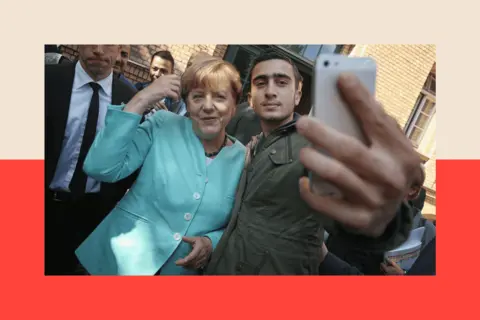 Sean Gallup/Getty Images
Sean Gallup/Getty ImagesThat optimistic proclamation soon became a political liability for Mrs Merkel. Political opponents and some European leaders felt the words acted as a magnet for asylum seekers to the EU. Within a fortnight the Chancellor was forced to impose controls on Germany's borders due to the influx of asylum seekers.
And a decade on, concerns over migration have become a major political issue in many European countries. The causes are complex and vary from country to country, but concerns around security, struggling economies and disillusionment with governing parties have all had a major role in shaping attitudes towards those who arrive who are fleeing war, hunger and economic desperation.
It has fuelled the rise of far right parties and seen centre and even left wing parties scramble to impose controls on migration, fearing electoral defeat by populist right-wingers. Data from the Atlas Institute of International Affairs shows how support for far right parties in Europe nearly doubled over the term of two electoral cycles to 27.6%.
Since 2015, when the UNHCR says over a million people entered Europe on asylum routes, there has been a dramatic drop in arrivals. But since 2016, the average number of people entering Europe has still been around 200,000 people a year. So far this year a total of 96,200 asylum seekers have been recorded arriving. So can tough new controls really further bring down the numbers trying to come to Europe? Or does global conflict and economic desperation make their continuing flow inevitable, with ebbs and flows in the numbers?
Hungary's tough stance
In Hungary, the far right government of Prime Minister Viktor Orban, has taken one of the toughest approaches to migration. Back in September 2015, I was present when Hungary's first fence was erected along the border with Serbia, and witnessed hundreds of people scrambling to cross into the EU before they could be shut out.
In Budapest, this week I met the country's minister for the EU, János Bóka, who said Hungary's approach has been vindicated by the restrictive measures now being put forward in the UK - where the government plan to make it harder for refugees to bring family members to the UK - as well as countries like Ireland, Denmark and Sweden.

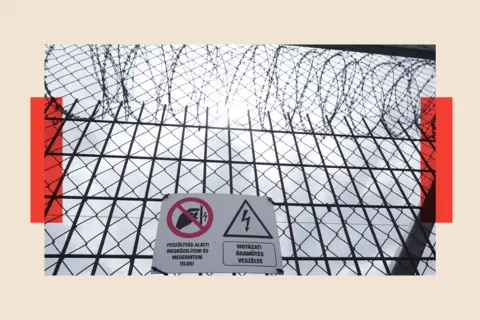
"We feel vindicated not only because of what's going on in other countries in Europe. This is of course also a sign that we took the right path 10 years ago, that now we see most of the countries are doing what we have been doing for the past 10 years."
Hungary immediately returns people who arrive at the border without permission to enter. They can only apply for asylum in the Serbian capital Belgrade, or in Kyiv in war battered Ukraine.
Human rights lawyer Timea Kovács says this effectively makes it impossible to enter the EU via Hungary. "Basically there is no legal way to enter the Hungarian territory as a refugee," she asserts.

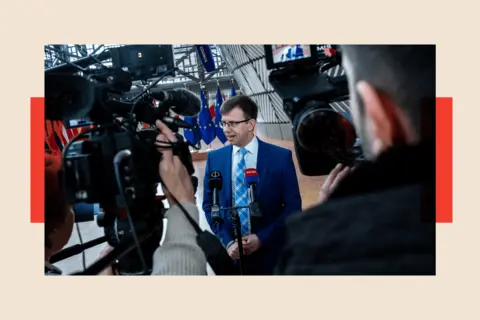 MARTIN BERTRAND/Hans Lucas/AFP via Getty Images
MARTIN BERTRAND/Hans Lucas/AFP via Getty ImagesAs a result Hungary is being fined one million Euros per day for breaching its responsibilities to asylum seekers under EU law. EU minister Bóka says the country is not about to change its policy. "If it is the price that we pay for the protection of our borders and maintaining peace and stability in Hungary, this is a price worth paying."
But even such restrictive measures haven't managed to entirely halt the entry of asylum seekers.
Austrian police told the BBC that there were between 20 to 50 people detected every day trying to enter their country illegally from Hungary. This is just the figure for those detected.
On a trip to the border with Serbia I heard the frustration of one group of Hungarian guards. We left the tar road and followed a patrol onto a dirt track into the forest. The trees closed over forming a natural tunnel. Bright sunlight gave way to shadows. The men in the vehicle ahead of us carried shotguns.
'Just one big circus'
Dressed in military camouflage Sándor Nagy and Eric Molner are citizen volunteers, paid by the state to patrol the Hungarian side of the border with Serbia.
"I feel sad and angry, and most of all, worried about what is coming," says Sandor. He believes Europe is failing to stop people from coming across its borders. "To be honest, what we experience here is basically just one big circus. What we see is that border defence here is mostly a show, a political performance."

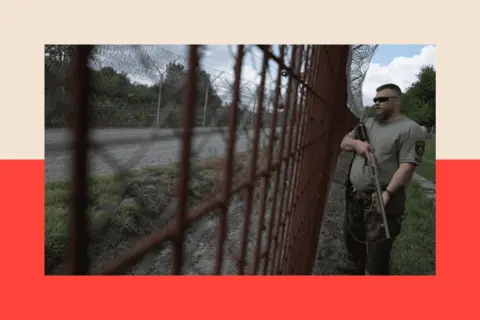
We emerge into a clearing where a 12ft high border fence appears, topped with barbed wire, equipped with sensors and cameras to detect illegal crossings.
"They simply cut through it, and groups rush in at several points at once—this has been the same for years." The problem, he argues, is with organised crime, which is constantly one step ahead of the authorities. "This fence does not stop anyone in the long run … It delays the flow, but cannot stop it."
A deluge of abuses
With the growth of criminal trafficking has come a deluge of human rights abuses, according to the United Nations. People traffickers dump people in the Sahara desert; others crowd them onto unsafe boats. Some of those who get through find themselves being forced back into the desert by local security forces.
More than 32,000 people have died trying to reach Europe in the past 10 years - including 1,300 dead or missing this year.
According to the UN's International Organisation of Migration "much of this is happening in a situation of near complete impunity".

 Carl Court/Getty Images
Carl Court/Getty ImagesThe summer of 2015 was not only a summer of welcome. It prompted immediate changes in the approaches of several European states. Not just with the erection of the fence in Hungary but, among several examples, the deployment of riot police in Croatia, and migrants being detained in Slovenia.
By March 2016 - six months after Mrs Merkel's statement - the EU had reached agreement with Turkey to keep migrants from crossing into Greece and Bulgaria.
Since then the EU has done deals with countries including Morocco, Tunisia, Libya and Egypt to prevent their countries being used as launch points to Europe.
Now, there are numerous well documented cases of asylum seekers being pushed back across EU borders by police and coast guards. Last January the European Court of Human Rights found Greece guilty of illegal and "systematic" pushbacks of asylum seekers to Turkey.

 Paula Bronstein/Getty Images
Paula Bronstein/Getty ImagesGerasimos Tsourapa, a professor of international relations at the University of Birmingham, describes the policy of outsourcing the asylum issue as a dramatic change for Europe. "The idea that migration can be leveraged for money or aid or other concessions, which was fairly exceptional for Europe in 2016, has now become a pattern.
"Migration diplomacy is contagious. Once the deal is struck then the logic spreads."
There is also a paradox here, he says. "We are restricting asylum, we're keeping borders closed, but we also need to find labour migrants to fill shortages and help our national economy."
A changing Sweden
Persistent public concern has seen a rise in support for far right parties across the EU, even in places like Sweden, which historically prided itself as a welcoming nation for those fleeing persecution. The far right Sweden Democrats won 20.5 percent of the vote in the 2022 general election - making them the country's second largest party. In return for supporting a minority coalition government they have seen much of their anti-migration platform shape government policy.
Family re-unification for migrants has been made more difficult, as have conditions for permanent residency, and asylum quotas have been substantially reduced.

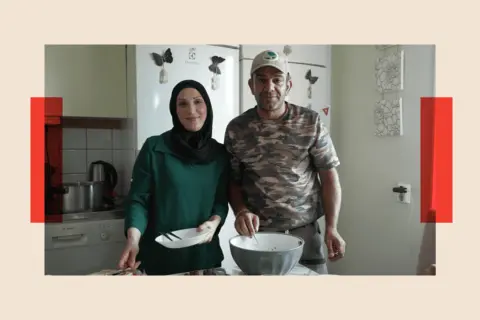
For the final leg of my journey I went to the western Swedish city of Karlstad, a picture postcard place on the banks of the River Klarälven, the longest waterway in Scandinavia.
Syrian refugee, Abdulmenem Alsatouf, 44, remembered the welcome he received here in 2015.
That has changed, he says. "At the beginning people treated us very well. But after a few years — and after the government changed — things shifted. They became more racist." He cites incidents of racist abuse, including one neighbour leaving a toy pig outside this devoutly Muslim family's home.
I first met Abdulmenem and his family ten years ago as they were trying to reach Europe from Turkey. I remember their hope for a new life. Now his wife Nour says she would prefer to be in Syria. "They look at us as if we only came here to take their money or live off their aid. But that's not true. When I first arrived, I studied Swedish for two years, I learned the language, I finished school. Then I went to work — cleaning, kitchens, childcare. I pay taxes here, just like anyone else. I'm part of this society."
Why has Swedish public opinion shifted to the right on migration? One of the more frequently cited reasons in local media and by politicians is crime, specifically the rise of organised crime, with young perpetrators used to commit extreme violence. Since 2013 the rate of gun crime in the country has more than doubled.
People born abroad, and their children born in Sweden, are over-represented in crime statistics. But Sweden's foreign ministry warns against a simplistic analysis of figures. It says low levels of education, unemployment, social segregation and refugee's war trauma are all causes - not the fact of being a migrant.
Outside the local cultural museum, where he and his apprentice were busy painting the walls, I met Daniel Hessarp, 46, who is among the 60% of Swedes that opinion polls record as being concerned about crime. "We see the statistics of the crimes, who does it and such. So, there you have the answer. We didn't have this before in Sweden.

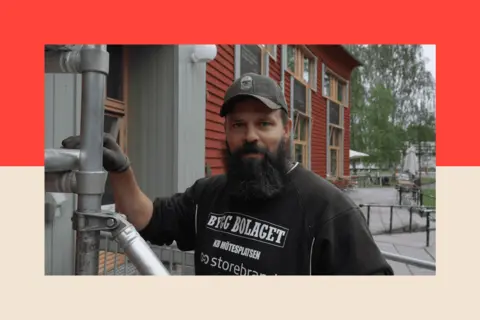
The apprentice, Theo Bergsten, 20, said he wasn't opposed to immigration because "you learn from, they learn from you…so it's really nice also." But he said the growth in crime was a "sad part" of the story.
Maria Moberg, a sociology lecturer at the University of Karlstad, says social media has allowed the far right's message to thrive and find new support among those who feel excluded from society.
"Sweden Democrats are very open with [us] - they don't want any asylum seekers. They actually want people to leave Sweden. And the whole government is sort of setting the agenda for being a hostile country. It's more acceptable now to not be welcoming."
Graves marked 'Unknown'
Back on Lesbos, I went to visit a place I have come to know over many years of reporting migration issues there. About 30 minutes drive from the Mytilene airport, in the middle of some olive groves, are the graves of asylum seekers who have died trying to reach here, or in the refugee camps set up after 2015. Numerous graves are simply marked 'Unknown', the last resting place of those who believed Europe would offer them a better life.
When I visited there were three fresh graves, and a fourth open waiting for a burial to take place. It is a sobering reminder that desperate people will keep trying to reach Europe, despite the enormous risks.

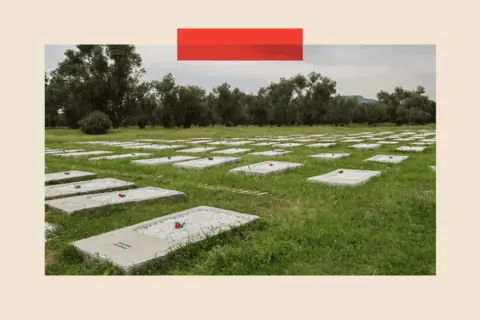 MANOLIS LAGOUTARIS/AFP via Getty Images
MANOLIS LAGOUTARIS/AFP via Getty ImagesSo far this year the numbers of asylum seekers detected trying to reach Europe is down by 20 percent. The numbers may surge and fall, but the global crises that drive migration are not going to disappear. That is the fundamental challenge for politicians, whatever party is in power.
Top image credit: Beata Zawrzel/NurPhoto via Getty Images
BBC InDepth is the home on the website and app for the best analysis, with fresh perspectives that challenge assumptions and deep reporting on the biggest issues of the day. And we showcase thought-provoking content from across BBC Sounds and iPlayer too. You can send us your feedback on the InDepth section by clicking on the button below.
My son's constipation wasn't taken seriously until he reached crisis point

 BBC
BBCA mother who feared her two-year-old son's untreated constipation could have killed him is calling for access to children's continence services to be made a national priority.
Elissa Novak said Ivan was constantly vomiting, losing weight and in severe pain when it was at its worst, and a doctor said 2kg of his 10kg (22lb) body weight was estimated to be stool.
The number of children aged up to 16 admitted to English hospitals suffering with constipation, among other symptoms, is at a 10-year high, with more than 44,000 admissions in 2023-24, according to NHS figures.
Children are being failed by the absence of dedicated bladder and bowel services in some parts of the country, an expert said.
About 1.5 million children in the UK suffer with constipation, according to the charity Bladder and Bowel UK.
As many children returned to school this week, charities have told the BBC they are seeing a spike in calls to their helplines.
"It's a huge problem and many healthcare professionals don't consider it a serious issue in children," said Davina Richardson, a children's specialist nurse with the charity.
"Discussing wee and poo is very un-British. It's not something that we as a culture do."
Elissa said Ivan, who is now aged five, had been "completely robbed of his toddler years" due to health issues resulting from constipation.
He was admitted to hospital 25 times in one six-month period in 2022 for emergency treatment.
"It was horrific," Elissa said. "He was so frail he couldn't lift himself up or do anything.
"He was in pain all the time and either screaming or just lying there because he was too weak."

 Elissa Novak
Elissa NovakElissa, 35, from Nuneaton, Warwickshire, said she had constantly gone to her GP to try to get help and answers.
At that time in Warwickshire, there was no bowel or bladder community service, which meant they were going to A&E up to four times a week.
It was only when things got to a crisis point that Elissa was told constipation was causing Ivan's pain.
She thinks he would have died had there been any further delay in treating it.
Elissa was told Ivan's entire colon was impacted, which had pushed up into his lung cavity and compromised his lungs.
'Signs missed'
"His stomach was squashed. All of his organs were being pushed out of the way," Elissa said.
"We were in A&E for up to 12 hours at a time... just waiting for an enema of all things.
"It was a very horrible time. It was so traumatic for everybody."
Ivan has two genetic syndromes which affect his cognitive functions.
Elissa thinks this played a part in the signs being missed and constipation not being diagnosed sooner.
"It was seen as 'that's just what disabled children are like'. We did actually have one consultant who said 'disabled children just scream'," Elissa said.
"It wasn't looked into properly, it wasn't taken seriously until he was really at crisis point. His signs of pain weren't recognised. It was just a perfect storm really."

 Elissa Novak
Elissa NovakIvan now has a care package so his constipation can be managed at home with laxatives and daily bowel wash outs.
"It is a huge part of his life and a huge part of his day. He still suffers pain but it's so much better," his mother said.
Elissa is campaigning for better bladder and bowel care services across the country.
"People are falling through the cracks," she said.


Tips for parents and carers
Here are some of the ways to prevent a child from becoming constipated:
- Ensure your child's diet includes plenty of fruit and vegetables
- Make sure children are drinking enough water-based drinks daily - dehydration can make constipation more likely or worse
- A good toilet position is also helpful. Children need their bottom and the backs of their thighs well supported. Feet need to be flat on a firm surface with knees slightly higher than hips, as that helps relax the pelvic floor
Source: Bladder and Bowel UK
Brenda Cheer, a paediatric specialist continence nurse with children's bowel and bladder charity Eric, said children's constipation was on the rise for a number of reasons, including delayed potty training and today's generation of children spending more time in childcare.
She said children were being failed in areas where there was no dedicated children's continence service.
"There's huge disparity of those services," she said.
"Where is the parent supposed to go? How are they supposed to get the help they need? How is a family supposed to access support if there is no children's bladder and bowel nurse?"
Constipation can be treated in the community and should not require a hospital admission, but is not being recognised, Ms Cheer added.


Holly Brennan told the BBC her daughter Ayda had suffered with chronic constipation for three years and she had been in "turmoil" at the lack of help.
It started when Ayda got a virus when she was two years old and spiralled from there, Holly said.
The 31-year-old described going to her GP six times and being prescribed laxatives to treat it - but not being given any guidance on how to use them, and said she had been told her daughter would grow out of it.
When it was at its worst, Ayda, now five, would have up to 15 accidents a day.
Holly, from Clevedon, Bristol, said: "It was three years of hell. She very much didn't grow out of it.
"We didn't want to go out for day trips because you wouldn't know where the toilet would be and she was constantly having accidents.
"It was just complete stress and caused arguments between my husband and I [about] how to deal with it. It upset her [Ayda] and you try not to get cross with them but it's just frustration and it just affects everything."


Sometimes it would take Ayda a week to go to the toilet because she associated it with pain, her mum explained.
"It was a vicious circle. It was just complete turmoil... something that everyone just used to say she would grow out of or 'it's a phase' or 'she just needs to learn'," Holly added.
"Our life literally revolved around the toilet for three years."
Holly was not referred for further treatment for Ayda or told about children's continence services that could help.
She said it felt like "the blind leading the blind" with several doctors unable to advise her and she had reached a dead end.
It was only when she was told about the charity Eric that things started to get better.
"There was finally an answer on how to help her," Holly added. "It [the website] described my child."
Ayda is now off laxatives and able to control her bowels.
"I'm very proud of her and how she's coped. She's taken it all in her stride," Holly said.
A Department of Health and Social Care spokesperson said it is committed to ensuring children get the right care and support when they need it for conditions such as constipation.
In a statement, it said: "As part of our 10-year health plan, neighbourhood health services will bring together teams of professionals closer to people's home to provide comprehensive community care.
"We will also strengthen health visiting services so all families have access to high-quality, personalised support."
Jodie Gosling, MP for Nuneaton and who chairs the all-party parliamentary group for bladder and bowel continence care, said constipation had fallen low on the list of priorities facing local council and integrated care boards.
She said children's continence care "has been a silent casualty of chronic underfunding and reactive healthcare".
"This leads to a postcode lottery, where even high-need areas fail to address issues like constipation adequately."
Follow BBC Coventry & Warwickshire on BBC Sounds, Facebook, X and Instagram.
30,000 homes fitted with botched insulation under government schemes, ministers admit

 BBC
BBCMore than 30,000 UK homes have had botched insulation fitted under government schemes putting them at risk of damp and mould, ministers have revealed.
It is the first time the government has documented the number of homes blighted by sub-standard work under ECO4 and the Great British Insulation Scheme since 2022.
Energy Consumer Minister Miatta Fahnbulleh told parliament it amounted to ''systemic failure". While some households have had remedial work done, anyone concerned should contact Ofgem, the government said.
Mohammed told the BBC he cannot sleep in his bedroom due to damp and mould and is battling to get it fixed: "I have been given nothing but broken promises and false hope."
Mohammed, who did not want to use his full name, applied to get external wall insulation fitted to his Luton home in 2023 under the government scheme ECO4.
He hoped it would make the house warmer and help his late father - who suffered from chronic asthma - to cope during the colder months.
But instead of providing relief, Mohammed said the botched insulation led to damp and mould which covered the walls of his father's bedroom and caused his condition to worsen.
''Day after day, he was forced to inhale this, further weakening his already fragile lungs. My father's health deteriorated until it was too late," he said.
For the last two years, Mohammed says he has had an '''awful battle'' to get the installer to take responsibility.
''The whole experience has taken such a toll on me mentally," he said.
Mohammed now can't sleep in his own bedroom due to black mould, damp and crumbling plaster.


After the BBC revealed last year that botched insulation was leading to damp and mould, the government ordered an audit be carried out of 60,000 properties insulated under the GBIS and ECO4 schemes.
The preliminary findings of the audit suggest that in more than 30,000 homes insulation was not fitted to the appropriate standard and this could lead to damp and mould growth, Fahnbulleh told parliament in a written statement in July.

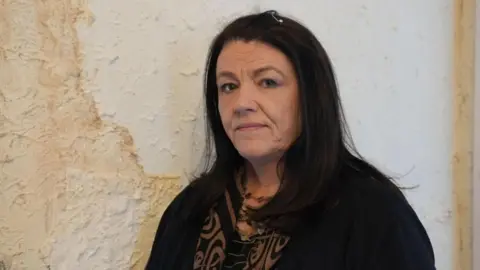
The government said it is ''working at speed to ensure substandard installations are identified and remediated with no cost to the consumer'.'
Ministers are also promising to soon set out plans to overhaul the consumer protection system ''to restore trust and help more people cut their bills''.
The task ahead is daunting - tens of thousands of homes are likely to need repairs.




Mohammed said he is now in talks with his installer and Trustmark, the organisation responsible for monitoring the quality of insulation, to try to get his home fixed.
Until that happens, he is worried about his young family's health.
"We are inhaling poor quality air because of the damp, the mould and the dust,'' he said.
More than 260,000 properties have had solid or external wall insulation fitted under government programmes over the last 15 years.
Audits are currently only being carried out on homes insulated since 2022 because, ministers argue, ''current data suggests there is not a widespread issue'' in earlier schemes.
Yet the BBC reported in February that residents of Chilton, County Durham, whose homes were insulated in 2021 have also had damp and mould.
The government says concerned consumers should contact Ofgem for advice and support by email at: ECOhelp@ofgem.gov.uk(opens in a new tab) or Freephone 0808 169 444 Monday – Friday (excluding bank holidays) 09:30 to 16:30
Judge overturns Trump administration funding cuts to Harvard

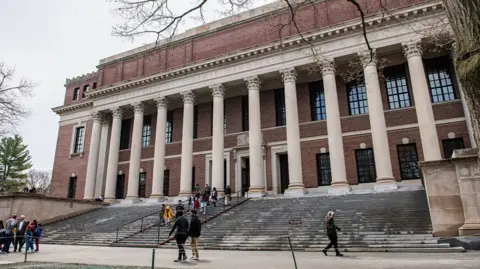 AFP via Getty Images
AFP via Getty ImagesA US federal court has overturned billions in funding cuts by President Donald Trump's administration to Harvard University.
Judge Allison Burroughs ruled the government violated the Ivy League college's free speech rights when it revoked around $2bn (£1.5bn) in research grants.
The ruling is a major legal victory for Harvard, but the White House has vowed to appeal. When it froze funding in April, the Trump administration accused the college of antisemitism, "radical left" ideologies and racial bias.
Three other Ivy League universities, Columbia, Penn and Brown, struck deals with Trump to preserve funding that was at risk due to similar claims by the administration, rather than go to court.
Boston-based Judge Burroughs wrote in Wednesday's ruling: "The Court vacates and sets aside the Freeze Orders and Termination Letters as violative of the First Amendment."
She blocked the administration from stopping any more federal funding to the Cambridge, Massachusetts-based college and barred the government from withholding payment on existing grants.
The White House said they would immediately challenge the "egregious decision" and called the judge an "activist" who was appointed by former President Barack Obama and was never going to rule in their favour.
"Harvard does not have a constitutional right to taxpayer dollars and remains ineligible for grants in the future," assistant press secretary Liz Huston said.
Alan Garber, president of the university, said in a statement on their website that "the ruling affirms Harvard's First Amendment and procedural rights".
"We will continue to assess the implications of the opinion, monitor further legal developments, and be mindful of the changing landscape in which we seek to fulfill our mission," he added.
Judge Burroughs wrote in her 84-page decision that Harvard should have done more to deal with antisemitism, which she said had "plagued" the institution in recent years.
"Harvard was wrong to tolerate hateful behavior for as long as it did," wrote the judge.
But she said that fighting antisemitism was not the Trump administration's "true aim" in penalising the nation's oldest and richest university.
She suggested the government had "used antisemitism as a smokescreen for a targeted, ideologically-motivated assault on this country's premier universities".
Judge Burroughs has previously blocked Trump's efforts to prevent Harvard from hosting international students.
The university sued the Trump administration over the funding freeze in April, while also pledging to fight antisemitism.
Harvard's president said no government "should dictate what private universities can teach, whom they can admit and hire, and which areas of study and inquiry they can pursue".
Trump has also threatened to revoke Harvard's tax-exempt status and take control of the university's patents stemming from federally funded research.
The government has been discussing with Harvard a potential deal to unfreeze federal funding. Trump has said he wants the university to pay no less than $500m.
Is £3bn Premier League spending cause for concern?
Is £3bn Premier League spending cause for concern?
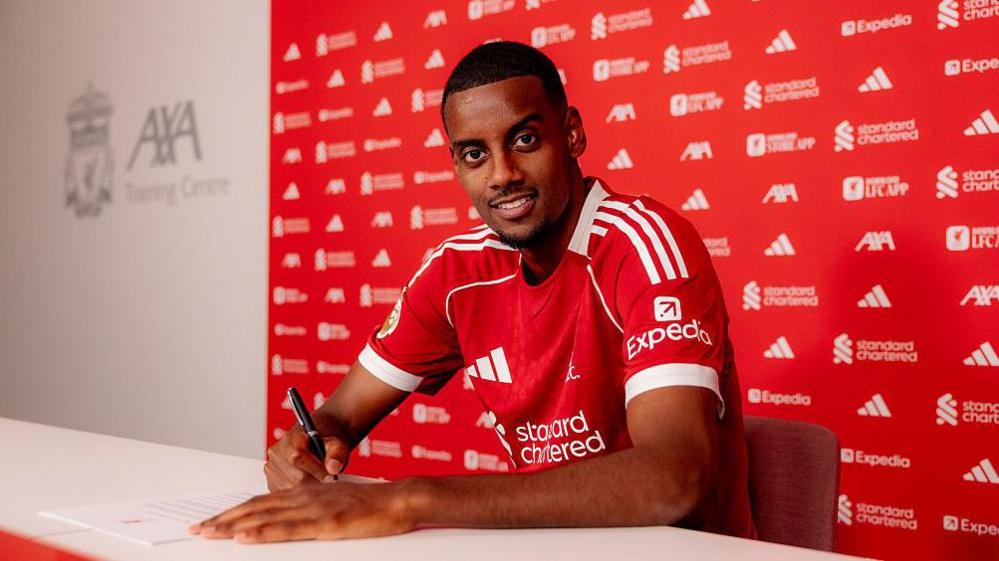
Alexander Isak signed for Liverpool from Newcastle for a British transfer record fee of £125m
- Published
It was the transfer window when spending by Premier League clubs entered uncharted territory.
Buoyed by the start of a record £6.7bn four-year domestic TV deal, and the extra revenue generated by newly expanded European club competitions, the top flight invested more than ever before this summer.
But while the unprecedented £3bn outlay, and the drama of a frenetic deadline day, undoubtedly fuels even more interest in the league, does it also raise concerns?
BBC Sport takes a closer look.
- Published2 days ago
- Published2 days ago
- Published14 hours ago
A widening gap?
On Wednesday, Fifa hailed "the continuing expansion of international player mobility and the growing scale of the global transfer system", adding that England "consolidated its position as the leading global investor in talent".
But for some, serious questions are raised by the fact Premier League clubs spent more than those from the Bundesliga, La Liga, Ligue 1 and Serie A combined - with concern over competitive balance.
Indeed, having seen both Florian Wirtz and Nick Woltemade choose Liverpool and Newcastle United respectively over Bayern Munich this summer, the German champions' honorary president Uli Hoeness spoke out, external about a "completely crazy" spending spree by their English rivals, claiming that it "can't end well".
After a string of other top players left the Bundesliga for England this window, Bayern head coach Vincent Kompany also lamented the struggle to compete with even the smaller Premier League clubs.
Promoted Sunderland, for instance, had a bigger net spend (£118m) than any club in mainland Europe, apart from Real Madrid.
And even in the Championship, Wrexham's £30m summer investment ensured a higher net spend than the likes of Barcelona, AC Milan and Borussia Dortmund.
At a time when Spain's La Liga and Italy's Serie A already want to stage regular season matches abroad, knowing they could be highly lucrative, could the disparity such leagues now face provide even more of an incentive for others to follow suit?
For former Liverpool managing director and Aston Villa chief executive Christian Purslow, the Premier League's spending is simply "a reflection of the huge success of a competition that has a level of media income that dwarfs those of its main rivals overseas".
Purslow is struck more by the gulf with the EFL, and that after two consecutive seasons in which the three promoted clubs from the Championship have been immediately relegated, "the huge leap required" to bridge the gap between divisions "seems to be getting wider".
But he seems most concerned with a growing disparity within the top flight, with another season of profit and sustainability rules (PSR) that limit financial losses forcing more clubs to sell more players in order to comply, and the league's elite talking advantage.
"While it's always been true that the biggest clubs come for players of 'middle-ranking' teams, that trend has become much more mainstream and is causing more of a polarisation between the winners and losers," Purslow told BBC Sport.
Purslow was reflecting on a window in which his former club Aston Villa sold Jacob Ramsey - who had been one of their few remaining senior academy products - to Newcastle United, who themselves sold homegrown Sean Longstaff to Leeds.
"Not only are we seeing the unintended PSR consequence of a perverse incentive to sell homegrown talent [because clubs' own academy products are counted as 'pure profit' in their accounts when sold], in general, the most likely buyers are often the so called 'big six' clubs, who are benefiting from more Champions League revenue than ever," Purslow said.
"It's a dangerous 'double whammy' that's being exacerbated. I think most fans really don't like it. They love to see the spine of their team have a connection to the local community, and seeing such players leave has an extra resonance.
"Fans know that owners are selling not because they don't have the financial resources, but to comply with the rules. So I think there's going to be more and more pressure to liberalise those rules because more fans think there's something wrong when teams like Newcastle and Aston Villa are being forced to sell players."
Having seen Manchester United and Spurs finish narrowly above the relegation zone last season, while the likes of Brighton, Bournemouth and Brentford achieved top 10 status and Crystal Palace won the FA Cup, the biggest clubs appear to have used this window to try to reassert their previous dominance by targeting their domestic rivals' talent.
Indeed, a record £1bn was spent between Premier League clubs, £200m more than last year.
For Purslow, that has strengthened the argument for a modification of PSR in order to encourage clubs to keep hold of the homegrown talent they have developed, and to allow owners to invest more and cover more losses.
"You have to have some level of control, but at the moment it's skewing the competitive landscape," he said.
"Why have rules that encourage us to sell homegrown talent? Let's just make academy players' salaries non-deductible for FFP. It would change behaviour overnight so clubs would keep those players."
Football finance expert Kieran Maguire agrees that the summer has reinforced a "major concern that the owners of the aspirational and ambitious clubs, such as Nottingham Forest, Aston Villa, Newcastle, and so on, are constrained in terms of their ability to spend in a way that didn't exist when Roman Abramovich acquired Chelsea [in 2003] and Sheikh Mansour acquired Manchester City [in 2008]".
Maguire added: "They're on the wrong side of history because the PSR rules, regardless of their intent, has created a glass ceiling and has prevented owners being able to subsidise the clubs to the level they would like."
Despite facing criticism from some clubs, the Premier League has defended PSR, insisting it is needed to avoid over-spending.
In February its clubs chose not to replace it with a new Uefa-style 'squad cost ratio' (SCR) system of financial control which allows them to spend a proportion of their total revenues on team-related costs, which is currently only being trialled.
The nine Premier League clubs that have qualified for European competition will have to comply with Uefa's SCR rules, which are stricter than PSR and allow spending on player wages and fees to amount to no more than 70% of revenues - down from 80% - for 2025.
"I think investment in squads is generally a good thing so long as everyone stays within the rules," Premier League chief executive Richard Masters told BBC Sport last month.
"Squads will be strengthened and that adds to the competitive element. It's a brilliant mix of the best stars from around the world and homegrown talent."
Money owed could be 'potentially contagious'
While the Premier League's overall net spend in the window was £1.36bn thanks to almost £2bn of player sales, Maguire also highlights the amount of deals taking place on credit.
Even before this window, outstanding deferred transfer instalments were more than £3bn. Now it will be much more.
"This is a relatively new phenomenon as transfer fees have increased," Maguire said.
"It is now common for deals to be spread over three to five annual instalments. As a consequence, clubs have ended up with significant transfer debt."
Maguire points to Manchester United, whose transfer payables have rocketed from £34m in 2013, to more than £400m this year.
He said: "This has created a new satellite industry in football where clubs who are owed money for transfers sell the debt to financial institutions and get cash early."
The Premier League can deduct funds from central distributions and redirect them to football creditors in the event of non-payment by a club, while all clubs have to submit financial statements with the aim of reducing the risk of default.
However, Maguire warns: "It will only take one club to have a financial problem for that to be potentially contagious and that could cause a huge ripple effect upon the senior clubs in both English and European football."
Loans and player power

Aston Villa signed Harvey Elliott and Jadon Sancho on loan on deadline day - with an option to make Elliott's deal permanent
Another notable trend this summer has been a flurry of loan deals, with options or obligations to buy.
While this can be in the interests of a player, it can also "help clubs from a PSR point of view as it can delay the cost of player purchases for 12 months", explains Maguire.
But with so many players being loaned out to other clubs, the transient nature of such arrangements also risks diluting the identity of teams.
In the middle of a cost of living crisis, some people are already troubled by the amounts of money being spent on transfers, player wages and agent fees, along with the emergence of so-called 'bomb-squads' of unwanted players.
But on top of that this summer was the perceived lack of loyalty surrounding two of the biggest transfers, those of Alexander Isak and Yoane Wissa, both of whom refused to train with Newcastle and Brentford respectively and issued statements demanding moves.
"I didn't think it was a good look," said Purslow, when asked about the way Isak agitated for his record-breaking transfer to Liverpool after an acrimonious split was finally concluded on deadline day.
Newcastle had rejected Isak's suggestion that he had previously been promised the opportunity to leave.
"Anyone who's worked in the game knows that if a club makes a promise, a player would get that in writing," said Purslow.
"In this case, that would have meant an escape clause, and then there's no debate, we would have seen his transaction happen much earlier. And so a player essentially forcing a move wasn't a great precedent.
"We should acknowledge that clubs often want and need to sell players, so it does cut both ways, but those conversations would happen in private."
In stark contrast, England defender Marc Guehi, who had kept training and playing for Crystal Palace, saw his dream move to Liverpool dashed having been widely praised for his professionalism.
Some will look at the potentially destabilising impact of so many deals - and those that collapsed - and conclude that the window should close before the start of the season.
Others will be concerned that by getting his wish, Isak could lead to more players actively trying to force a move in future.
Regardless, with legal action having recently been launched against Fifa over its transfer rules, some believe players could soon be able to terminate their own contracts, without paying compensation, before those deals come to an end.
Ticket prices
Another worry for many will be the risk that clubs seek to recoup some of their record spending by increasing ticket prices.
League One Mansfield Town manager Nigel Clough has said the Premier League's outlay has become incomprehensible, and risks "pricing fans out".
And with 13 out of the 20 clubs having raised season ticket prices last season, "there is no case for further increases", Football Supporters' Association chair Tom Greatrex told BBC Sport.
"Matchday income generates a small proportion of a club's income, the vast majority comes from media revenues, so squeezing loyal fans further raises little extra money," he said.
"Clubs should listen to their supporter groups who have, across the board, backed our Stop Exploiting Loyalty campaign which calls for a freeze on ticket prices."
Related topics
- Published15 August

Rayner 'clings on' as she 'fights for political survival'



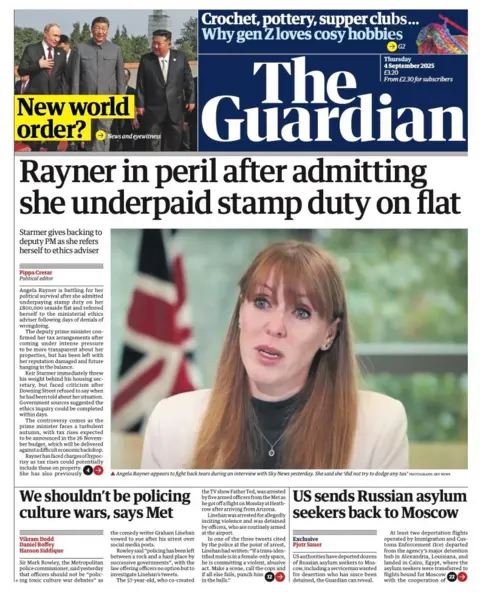



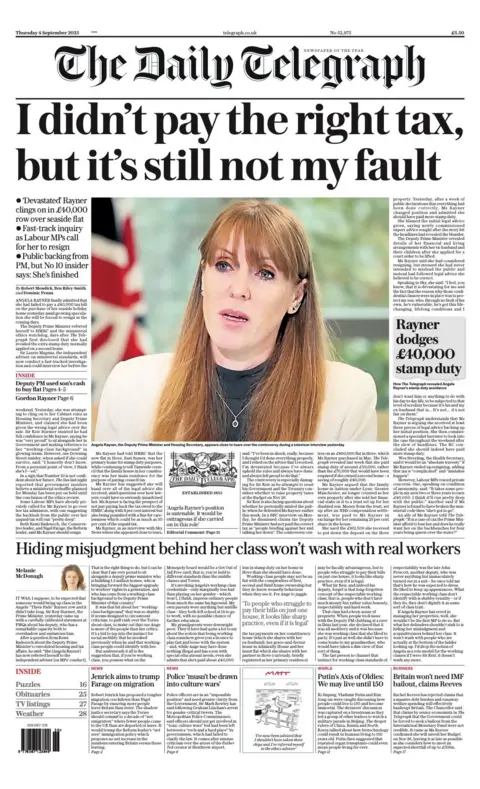

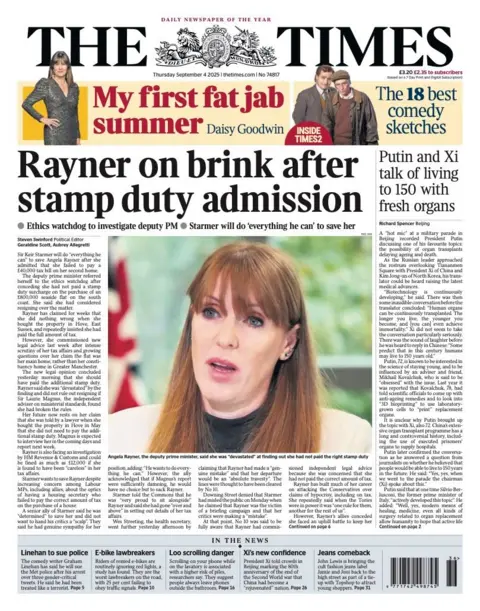



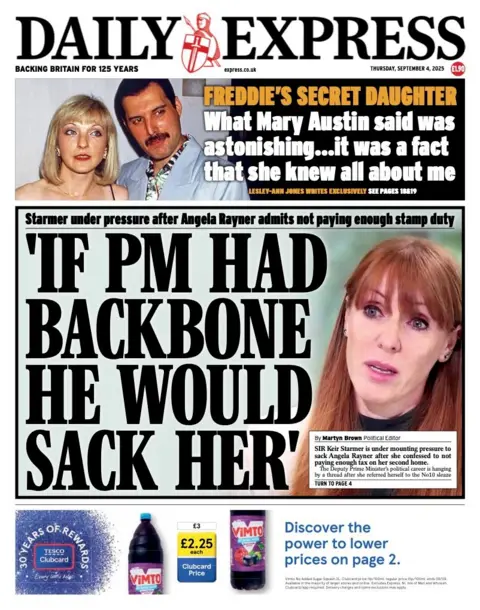

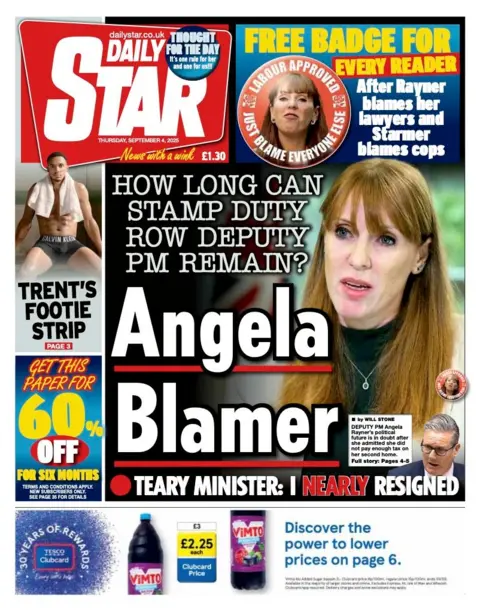

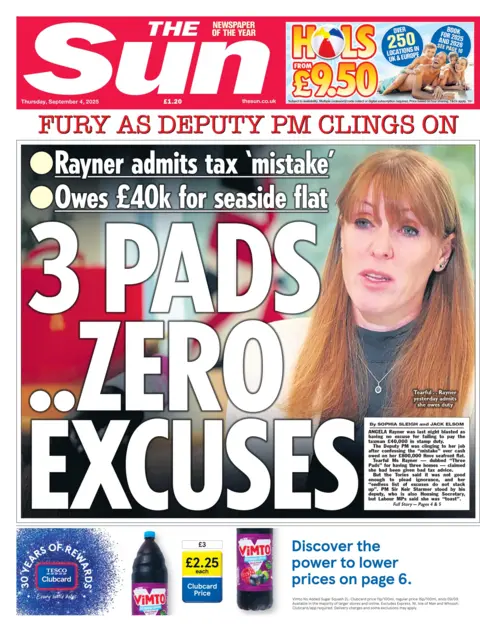


Many of Thursday's papers lead on Angela Rayner's stamp duty admission.
"If PM had backbone he would sack her" reads the Daily Express' headline.
The Daily Mail asks if Sir Keir Starmer is too "spineless" to fire her, reminding its readers that as well as being the deputy prime minister, Rayner is the housing secretary. It says she is "fighting to save her political career".
The Metro leads with the Conservative leader Kemi Badenoch's comments calling for her to be sacked.
"Three pads... zero excuses" reads the Sun's headline.
The Daily Telegraph says she has the public backing of Sir Keir, but quotes a No 10 insider who says "she's finished".

 Reuters
ReutersThe Daily Mirror leads with another story: the family of Virginia Giuffre, who sued the Duke of York for sexual assault and later took her own life, warning that they will not be silenced.
Her brother has called for files relating to the late sex offender, Jeffrey Epstein - who was at one time friends with Prince Andrew - to be released. Ms Giuffre's claim against Prince Andrew was settled out of court. Prince Andrew has consistently denied all the allegations against him.
The Guardian highlights comments by the head of the Metropolitan Police, Sir Mark Rowley, who said forces shouldn't be "policing toxic culture war debates". His remarks follow the arrest of the comedy writer, Graham Linehan, on suspicion of inciting violence in social media posts about trans people.
Sir Mark said policing had been left "between a rock and a hard place", according to the paper.
The Times says underperforming universities could be stopped from charging full tuition fees, under plans being considered by the regulator. The paper interviewed the new chairman of the Office for Students, Prof Edward Peck, who told it that the ratings institutions get "will have consequences".
The Financial Times says scientists in London have used artificial intelligence to help teams of robots work together without colliding. It says the system, known as Robo Ballet and developed by researchers at University College London, aims to boost the efficiency of various production lines.
Some supermarket chains are introducing a new scanner, which will tell shoppers how long their avocados have before they go off, according to a report in the Daily Mail. It says the company behind the technology, One Third, wants to cut down on food waste.


Sign up for our morning newsletter and get BBC News in your inbox.


Unanswered questions on Angela Rayner's tax admission

 PA Media
PA MediaDeputy Prime Minister Angela Rayner is at risk of a fine from the tax authorities in addition to having to pay an additional £40,000 in underpaid stamp duty, tax experts have said.
Rayner, who is also the minister in charge of housing, has admitted she paid less in stamp duty on her £800,000 flat in Hove, East Sussex, than she should have done, claiming she was badly advised.
HM Revenue and Customs (HMRC) can levy penalties when tax has been underpaid if someone has been "careless" with their tax affairs.
Any penalty for Rayner, which is typically 20% or 30% of the underpaid tax, could hinge on whether she took appropriate legal advice.
Rayner has said she was misinformed by lawyers, but questions have been raised about whether she sought specialist tax advice.
Even if she did, she could still face a fine likely to be 30% of the underpaid tax, meaning an additional £12,000.
"Someone has made a big mistake. Whether it's the law firm acting for her on the purchase, or whether it is her," said Sean Randall, an independent stamp duty expert.
He said she was at "significant risk" of a penalty because blaming an adviser may not be a sufficient defence.
"She might say I relied on my tax advisers to advise me correctly. And I definitely sympathise with that [but] usually simply relying on your adviser is not a defence for a penalty of carelessness," Randall added.
What we know
The dispute centres around a three-bedroom flat in Hove, East Sussex which Angela Rayner bought for £800,000 in May this year.
When she bought the flat, she declared that it was the only property she owned, meaning £30,000 of stamp duty was paid, rather than the £70,000 due if it is a second home.
She claimed it was the only home she owned because she had previously given up her stake in the family home in her constituency in Ashton-under-Lyne, Greater Manchester.
Rayner had bought that property with her then-husband, Mark Rayner, in 2016.
As she outlined in a statement, in 2020 a trust was set up under the instructions of a court to manage a payout for a medical incident which had left their son with life-long disabilities.
In 2023, when her divorce from Mark was finalised, the pair elected to place part of their stakes in the home into their son's trust, for which they are among the trustees.
This was to enable a "nesting" arrangement, meaning the children could remain in the family home while the parents alternated living there.
Rayner sold her remaining 25% stake in the home to her son's trust in January this year, for which she received £162,500.
The trust had been set up by Shoosmiths, a major law firm which offers advice on many areas of law including tax and property.
But when she purchased the flat in Hove , she sought legal advice from a different, unidentified firm.
In a statement, a spokesperson for Shoosmiths told BBC News that they "did not act for the Rt Hon Angela Rayner in relation to the purchase of her Hove property and/or the [stamp duty] aspects of that property.
"Ms Rayner is not a current client of the firm and has not been for some time."
Rayner's team have not provided details of the law firm she used instead, and it is not clear if this was a conveyancing lawyer who specialises in property transactions or more specialist tax advice.
Rayner said that when she bought the Hove flat, "my understanding, on advice from lawyers, was that my circumstances meant I was liable for the standard rate of stamp duty".
This was because she had no financial stake in the Ashton home, even though her children remained there and she considered it her main residence. She also spends time at a government-provided flat in Admiralty Arch, central London.
However, this legal advice was wrong. This is because under tax law, if a property has been placed into trust for the benefit of children under 18, the parents of those children are deemed to be owners of the home for stamp duty purposes.
"If you have a trust in favour of your children, then it's treated as your property," said Dan Neidle, founder of Tax Policy Associates and a member of the Labour Party.
"We're talking about a deeming rule which deems a person, in this case Angela, to own a property in the stamp duty world…in circumstances [where] she doesn't own it at all in the real world," Randall added.
Unanswered questions
The question of what legal advice Rayner took when she bought the Hove property is crucial.
If it was simply a conveyancing lawyer with no tax expertise it is likely to be much harder for her to argue that she hasn't been negligent - and to avoid harsh penalties levied by the taxman.
"My suspicion in this case…is that she didn't give all the circumstances of the trust to the conveyancing lawyer," said James Quarmby, head of private wealth at Stephenson Harwood.
"The conveyancing lawyer may have just asked the bland question 'do you own any other properties?' And she says 'no'".
He said property lawyers typically state in their contracts that they don't provide tax advice.
Quarmby said he believed there was a "high" risk of Rayner being fined and that tax officials would want to see the advice she relied on and details of the instructions she had given her lawyer
"Relying on advice is not a complete defence - it must be reasonable to do so in the circumstances and that advice cannot be 'obviously wrong'," he said.
"Someone in the Revenue now with the whole glare of the UK's media on them is going to make a decision as to whether Rayner was careless," he said.
"If she gets a penalty for carelessness she is politically screwed".
Another key question - if the legal advice sought was from a conveyancer - is whether Rayner even mentioned her son's trust and the role it played in the ownership of her family home.
A spokesman for Rayner declined to answer these questions.
"If you're buying property and you have complicated affairs involving a trust, you need to speak to a tax adviser and tell them about the trust," Neidle said.
"If she did that and they got it wrong, {it is} not her fault. But if she didn't go to a specialist or didn't tell them about the trust, I think it was her fault," he added.
"I think a normal person with any sophistication would realise they should mention the trust when getting advice about something else. And a deputy prime minister who's already got into a previous tax scrape involving properties, surely should have a go."
He said this would also affect how HMRC levied penalties on the underpaid tax.
Rayner now faces an inquiry by the standards watchdog.
She has previously been critical of tax avoidance and also called former Conservative chancellor Nadhim Zahawi's position "untenable" when details emerged that he was in dispute with HMRC over his tax affairs.
Zahawi, who was forced to resign as Tory party chairman for failing to declare that he paid a settlement to HMRC, ended up paying £5m to settle the dispute - a sum which included a 30 per cent penalty for being "careless".
A similar verdict on Rayner's conduct from Sir Laurie Magnus, the independent ethics adviser, or from the tax authorities may prove politically fatal.
As Starbucks Slumps, a Chinese Coffee Giant Sees an Opening in New York
麻了麻了,广州的房价跌麻了
买的时候小区平均 3.7w
今天卖出去一套 2.2w 的
9 层小楼非大高层,有玩物业,带电梯,学位差,地铁口 15 分钟,公交车 20 分钟到天河
海珠区
卖不出去好
有人卖出去才发现这哪里是跌,跟腰斩没区别了吧
你问我为啥买
家里 80 多的老人,谁敢租房子给我们
这次不一样?次次都一样
开发了一个完全免费的查看网站流量的浏览器和分析网站关联网站的浏览器插件!
🚀 SiteData - 免费的网站流量工具 & AdSense 反查浏览器插件

SiteData 是一款 💡 免费、隐私友好的插件,帮助你快速查询任意网站的流量趋势、关键词分布、流量来源,并通过 Google AdSense Publisher ID 反查发现关联网站。无需登录,所有数据均保存在本地设备。
👉 官方网站: https://sitedata.dev
👉 Chrome 插件下载: 点此安装
🔑 核心功能
- 📊 网站流量快照:查看访问量、用户参与度、热门页面
- 📈 近三个月流量趋势:直观展示网站增长或下滑走势
- 🌍 流量来源渠道:搜索、社交、外链、直接访问,一目了然
- 🔎 关键词情报:发现网站排名关键词和优化机会
- 🏷️ 反查 AdSense:检测网站的 Google AdSense Publisher ID ,发现同一账号下的关联站点
- 🌐 出站域名流量详情:快速查询网站的外链跳转及流量流向
- 🗂️ 域名注册信息查询:快速获取域名注册时间、到期时间等 Whois 数据
- 🛡️ 100% 免费 & 隐私优先:无需注册,无跟踪,权限极少
- 💻 本地存储:你的研究数据仅保存在自己的电脑
⚡ 使用方式
- 安装 SiteData 插件
- 打开任意网站并点击插件图标
- 即刻查看该站点的 流量、来源、关键词、出站域名 & AdSense ID
- 深入探索:快速发现与其关联的网站与域名信息
💎 为什么选择 SiteData
- ⏱️ 零门槛上手:安装即用,无需账号和 API Key
- 🎯 一站式研究:同时掌握流量、关键词、变现和域名数据
- 🔐 隐私保障:所有处理均在本地完成,数据不出设备
👉 官方网站: https://sitedata.dev
📸 软件截图
网站流量快照:查看访问量、用户参与度、热门页面

反查 AdSense 涉及的网站

🎥 操作视频演示
[Web3]尝试了 Planet 感觉非常有意思,我在想是否可以通过 Planet 部署一个后台或者应用
欢迎关注我的博客,主要分享一些学习感悟和行测申论学习历程 k2eastface.sol.build
请问玩 $V2EX 但是有留 base64 wx 留言过有违法追究风险吗?
目前有创一个小号来玩,但一直有这个担心
做自媒体和独立开发 , 你更看好哪个 ?
做自媒体和独立开发 , 你更看好哪个 ?
现在工作完全没有干劲,但是又不得不干,还不能干的太差
因为有贷款,必须保证自己有工作,要赚钱啊。
现在回想起来,相比较坐班的每个月工资,做副业那一声声“支付宝到账……元”更能让我快乐。why ?











